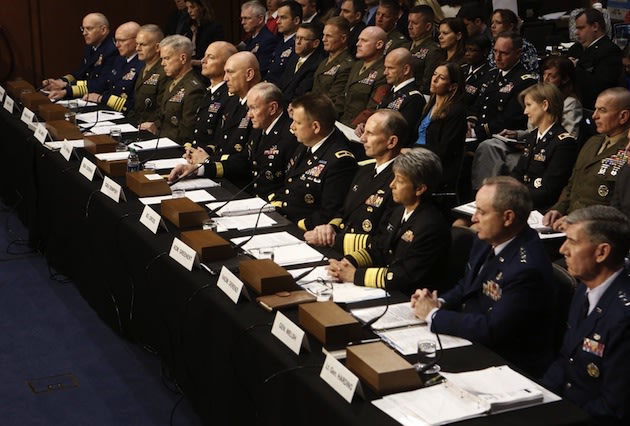 Military generals testify on June 4. (Larry Downing/Reuters)
Military generals testify on June 4. (Larry Downing/Reuters)
Facing fierce criticism about an epidemic of sexual assault in the military, the military's service chiefs made a rare joint appearance on Capitol Hill on Tuesday. Their mission: to press for commanders to retain control of prosecuting these cases?something select members of Congress are fighting against.
We can "fix this through the commander-- not around him," Gen. Martin Dempsey, chairman of the Joint Chiefs of Staff, said during testimony before the Senate Armed Services Committee.
?The risks inherent to military service must never include the risk of sexual assault," Dempsey said earlier in his opening statement. He noted that there are "reasonable recommendations" being made by Congress to reform the military justice system, but he called for commanders to "remain central to the legal process.?
Army Chief of Staff Gen. Raymond Odierno expressed a similar sentiment in his opening remarks, saying, "We cannot simply legislate our way out of this problem."
He added, "We can and will do better," and specified needed changes to the military's environment as well as to its accountability process.
A Pentagon report released May 7 estimated that 26,000 members of the military experienced unwanted sexual contact in unreported incidents in 2012, a 35 percent increase over 2010 incidents. After both the report and the recent arrest of the Air Force's head of sexual assault prevention, select members of Congress proposed legislation to reform aspects of the military justice system.
Democratic Sen. Kirsten Gillibrand of New York has proposed transferring authority from commanders to independent military prosecutors to prosecute serious crimes including sexual assault. This would require rewriting the Uniform Code of Military Justice.
Supporters of Gillibrand's bill note that victims fear retaliation when they see their superiors will be handling these cases and do not believe all commanders can be objective in these situations or will push for serious consequences.
The proposal has drawn sharp condemnation from military leaders, including Tuesday's witnesses, which included the military chiefs, judge advocates, and legal counsel.
The generals argued on Tuesday that the change would undermine the authority of commanders and the chain of command?a view shared by the committee's ranking Republican senator, Jim Inhofe of Oklahoma.
And Democratic Sen. Claire McCaskill of Missouri, who has introduced a bipartisan bill designed to better hold perpetrators accountable, blasted the generals during Tuesday's hearing for not doing enough to fix the issue of sexual assault.
For a start, McCaskill called on the generals to stop reporting all sexual crimes including rape as "unwanted sexual contact," which can include a broad range of offenses.
"We need to know how many men and women are being raped ? and we have no idea right now," McCaskill, a former prosecutor, said, referring to the latest Pentagon report.
She called on the generals to work toward "creating a culture where victims are coming forward." She asked generals to stop considering how well someone has served in their capacity as a member of the military when deciding whether to prosecute a felony case.
That same criticism was repeated by multiple members of the committee.
Republican Sen. John McCain of Arizona, a decorated war veteran, told the panel that he could not currently give a mother "unqualified support" for her daughter's decision to join the military in light of the sexual assault estimates.
Many members expressed a desire to better screen new members of the military to potentially weed out those who may commit sexual assault.
One lawmaker went so far as to suggest that the age of military volunteers makes sexual offenses more likely.
"The young folks who are coming into each of your services are anywhere from 17 to 22 or '3," Republican Sen. Saxby Chambliss of Georgia said. "Gee whiz, that's the hormone level created by nature. [It] sets in place the possibility for these types of things to occur."
He continued by reprimanding the military as well as Congress for not doing their jobs effectively enough to curb the sexual assault epidemic. "We simply can't tolerate it," Chambliss said.
A panel of commanders who testified later Tuesday following the generals agreed with the assessment that commanders should retain control of the process. A third panel of victims' advocates and others was scheduled to address the committee Tuesday afternoon.
Tuesday's hearing highlighted criticism of the military's ability to prosecute and report sexual assault cases and support victims that many say has existed for many years. Many members used the Pentagon report as a reason to revive efforts to reform the military's prosecutorial processes.
President Barack Obama, during a news conference with visiting South Korean President Park Geun-hye on the day of the report's release, had issued a fierce denouncement of sexual assault in the military. "I have no tolerance for this. ... If we find out somebody is engaging in this stuff, they're going to be held accountable?prosecuted, stripped of their positions, court-martialed, fired, dishonorably discharged. Period. It's not acceptable," he said.
Obama also said he had spoken with Secretary of Defense Chuck Hagel that morning regarding the need to "exponentially step up our game."
He added, "We have to do everything we can to root this out," and noted that those affected should understand the president has "got their backs."
louisiana primary syracuse basketball chipper jones chipper jones mickael pietrus heart transplant the international
No comments:
Post a Comment